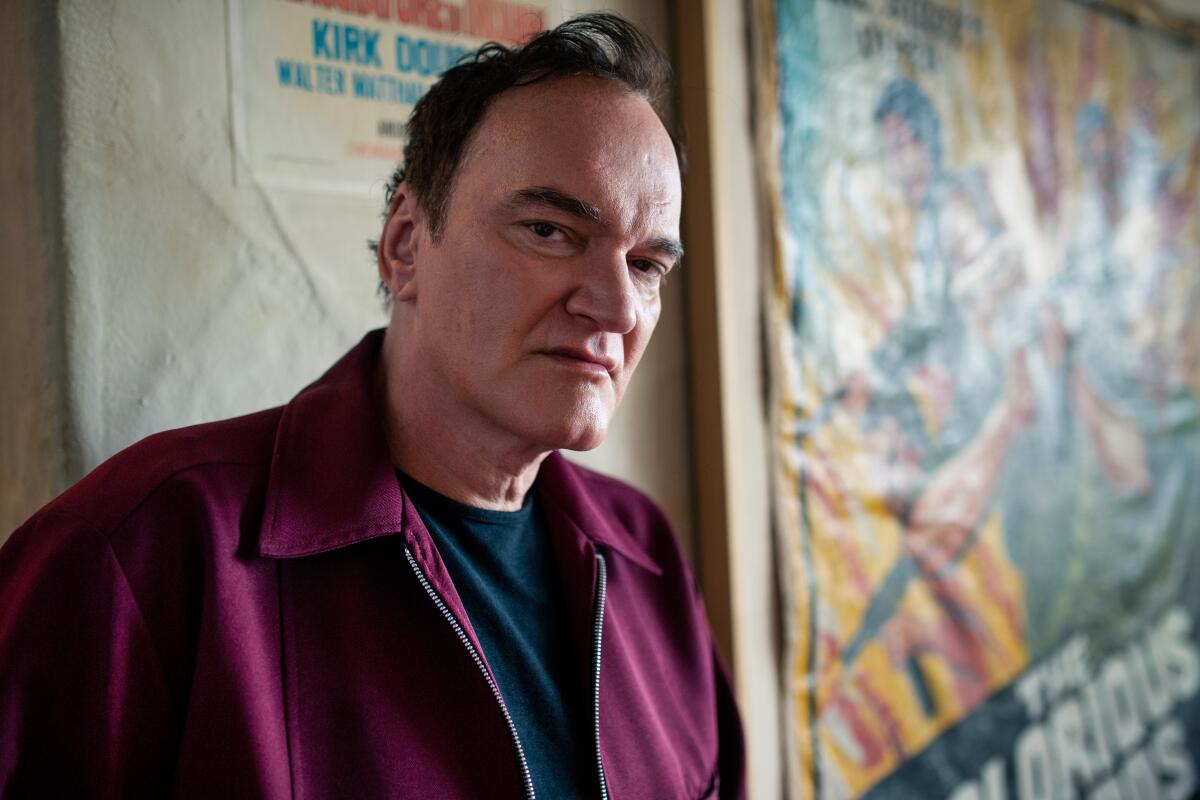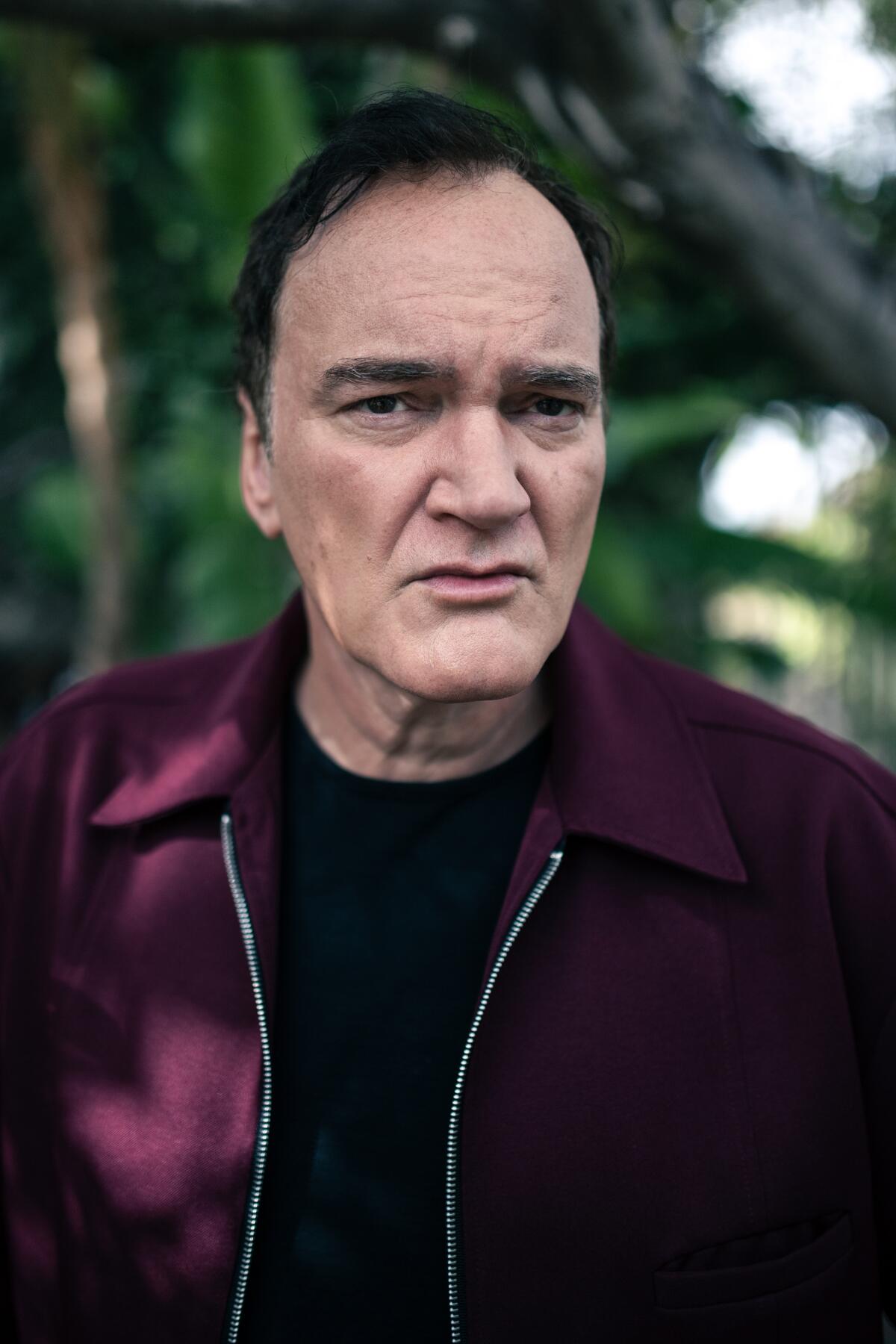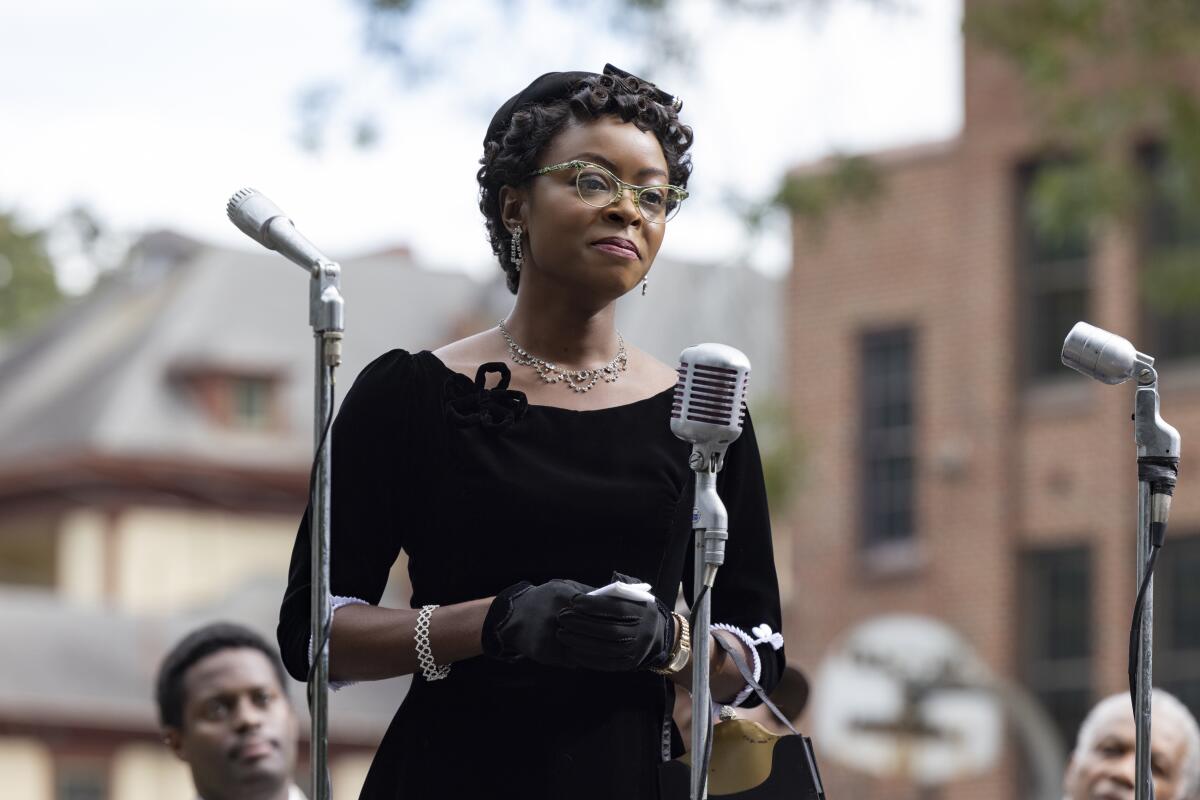‘Cinema Speculation’ with Quentin Tarantino

- Share via
There’s a darkness on the edge of town — and on the edge of my weekend. You know it’s coming. I know it’s coming. What can you do ... except maybe run out and enjoy a sunset before it starts getting dark absurdly early on Sunday.
Sign up for The Envelope
Get exclusive awards season news, in-depth interviews and columnist Glenn Whipp’s must-read analysis straight to your inbox.
You may occasionally receive promotional content from the Los Angeles Times.
I’m Glenn Whipp, columnist for the Los Angeles Times, host of the Envelope’s Friday newsletter and the guy who’s pretending that’s it not really beginning to look a lot like Christmas, despite the fact that my local Trader Joe’s was playing holiday music the day after Halloween.
Let’s see who’s been naughty and nice this week. (Sorry. Peer pressure.)
‘Cinema Speculation’ with Quentin Tarantino
Quentin Tarantino is brewing some coffee and it is, as Samuel L. Jackson’s “Pulp Fiction” hit man would enthuse, “some serious gourmet s—,” served up in a mug bearing the logo of his podcast “Video Archives,” named after the famed Manhattan Beach video store where Tarantino worked in his early 20s before becoming a filmmaker.
We’re settling into the library of Tarantino’s Hollywood Hills home, though pretty much any room in this spacious, multilevel mansion could technically qualify as a library. There are piles of film books and magazines in nearly every corner and on every surface, rows of vinyl record albums snaking across the carpeted and tiled floors, metal carts overflowing with VHS tapes just off the kitchen, revolving racks of comic books clamoring for attention. And we haven’t even ventured into the guest house, where Tarantino stores a vast collection of magazine and newspaper clippings. It’s not “Hoarders” — there’s too much floor space — but, safe to say, the man will never want for entertainment.
It’s Halloween, and Tarantino’s wife, Daniella, and their two children are home in Tel Aviv, where the family splits its time during the year. Left to his own devices, Tarantino has been going through his horror movie collection, making a little stack to watch later that evening. These are films he hasn’t viewed since they came out, like the 1977 supernatural thriller “The Sentinel,” and others he has never seen at all (“perhaps for good reason,” he says, laughing) like “Man’s Best Friend,” which has Ally Sheedy unwittingly adopting a genetically altered dog.
Neither of these movies is mentioned in Tarantino’s new book, “Cinema Speculation,” though the volume, the first work of nonfiction from the 59-year-old filmmaker, is full of references and reveries to other genre movies (Tobe Hooper’s slasher flick “The Funhouse,” the vigilante thriller “Rolling Thunder”) as well as musings on those more generally accepted as classics, including “Bullitt” and “Dirty Harry.” There’s a chapter pondering what “Taxi Driver” might have looked like had Brian De Palma directed it instead of Martin Scorsese. (De Palma was the first to read Paul Schrader’s screenplay.) There’s even an appreciation of longtime Los Angeles Times film critic Kevin Thomas, whose enthusiastic reviews of exploitation movies captivated Tarantino as a young reader.
Tarantino and I spoke earlier this week. Whenever we talk for an interview, I go in thinking, “OK ... I gotta keep him focused because he’ll go off on tangents.” Looking back, I was the one who needed to stay focused, because I led him down a number of side paths (Elvis movies, the best way to read his book, where he sees films these days) that were interesting enough but didn’t make it into the story.
I did ask him about a line in the book about how “solving the problems, both large and small of your actors — lead actors especially — is the job of a film director.” He gave me an example from his own career ... another anecdote that didn’t make the story, but I’ll share it here.
“We were making ‘Jackie Brown’ and Pam [Grier] had a big scene, but then she just heard that one of her beloved dogs back home in Colorado might not make it through the weekend,” Tarantino remembers. “She’s not going to be able to say goodbye to it. There’s nothing I can do about that other than commiserate with her and give that situation the respect it deserves ... but also get her to the spot where we can still do the work, if that’s possible. Just be as sensitive as I can. She was heartbroken ... but we did get there with time.”

AFI Fest returns: What you need to see
The AFI Fest is currently up and running in Hollywood. And while it isn’t quite back to pre-pandemic proportions — it’s just five days instead of eight — it remains, in the words of Times film critic Justin Chang, “Los Angeles’ flagship film festival, a well-curated and wide-ranging international roundup of some of the year’s strongest movies, held in a city that often takes such events — and the pictures themselves — for granted.”
Justin offered a great lineup of AFI Fest highlights for those looking to see a good movie this weekend. Head to fest.afi.com for tickets and the schedule.

Enjoying this newsletter? Consider subscribing to the Los Angeles Times
Your support helps us deliver the news that matters most. Become a subscriber.
How Hollywood turned a blind eye to Emmett Till
With “Till” in wide release right now, my pal Greg Braxton took a thoughtful look at why it took so long to bring the story of the brutal killing of 14-year-old Emmett Till — a pivotal event in the civil rights movement, thanks to his mother’s relentless pursuit of justice — to the screen.
Till’s mother, Mamie Till-Mobley, long pushed for a movie that would dramatize the troubling events surrounding her son’s death. “The biggest thing that Mother Mobley ever wanted was to bring Emmett’s story to the big screen,” said Keith Beauchamp, director of the documentary “The Untold Story of Emmett Louis Till.” “She would say, ‘Keith, you must continuously tell Emmett’s story until man’s consciousness is risen, because only then will there be justice for him.’”
“Attempts by Till-Mobley and others to develop projects about the killing ran into roadblocks for close to seven decades,” Greg writes. “Hollywood favored civil-rights-themed projects about the Rev. Martin Luther King Jr. and films like 1988’s ‘Mississippi Burning’ in which the dominant characters were white.”
Till-Mobley died nearly two decades ago, much too late for her to see her dream come true. But that doesn’t mean you can’t.

Feedback?
I’d love to hear from you. Email me at glenn.whipp@latimes.com.
Can’t get enough about awards season? Follow me at @glennwhipp on Twitter.
Sign up for The Envelope
Get exclusive awards season news, in-depth interviews and columnist Glenn Whipp’s must-read analysis straight to your inbox.
You may occasionally receive promotional content from the Los Angeles Times.




